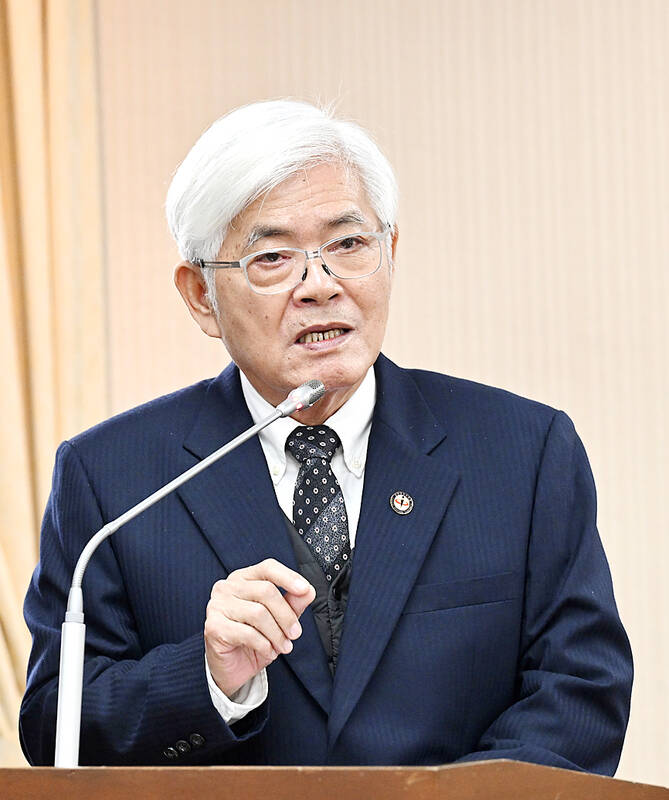Central Election Commission (CEC) Chairman Lee Chin-yung (李進勇) yesterday said that absentee voting should first be allowed in referendums on key issues, but election reform should proceed cautiously to prevent foreign nations from interfering in elections.
“One of the major challenges that democratic nations face is severe election interventions from external forces,” Lee told reporters before a meeting of the legislature’s Internal Administration Committee. “We should ensure that any change to the election system would be as perfect as possible and that it would continue upholding core democratic values.”
The Executive Yuan last month proposed permitting transfer voting, a type of absentee voting, in referendums, Lee said.

Photo: Lo Pei-de, Taipei Times
“We have had experience with transfer voting. By allowing transfer voting in referendums, we hope to collect feedback from all stakeholders before making the voting method available in elections,” he said.
Absentee voting should ensure that voters are able to exercise their right of free will, and the right to cast a secret ballot should be protected, he added.
“We have submitted our proposed amendment to the Referendum Act (公民投票法) to the legislature for review and hope it would be passed during this legislative session. This would be crucial in making a firm and steady step toward absentee voting,” Lee said.
Transfer voting allows voters to cast ballots in polling booths that are not ones assigned to them based on their registered address. Voters who request transfer voting must still personally cast their votes in polling booths.
The Chinese Nationalist Party (KMT) caucus is pushing to have the government administer postal voting, which would allow voters at home and overseas to mail in their ballots.
Meanwhile, National Security Bureau Director-General Tsai Ming-yen (蔡明彥) said on the sidelines of a meeting of the legislature’s Foreign Affairs and National Defense Committee yesterday that many nations take into account national security implications before allowing absentee voting.
“From the bureau’s perspective, we will remind lawmakers and government officials of the risks involved in postal voting. Voters who are in other nations, particularly those in China, might be directed to vote against their will,” Tsai said.
Democratic Progressive Party Legislator Huang Jie (黃捷) also questioned the feasibility of allowing Taiwanese working and studying in China to mail in ballots.
“Australians can safely cast their votes in China because they can vote in the Australian embassy there without worrying that somebody would force them to change their vote,” she said at a meeting of the legislature’s Internal Administration Committee. “How can we make sure Taiwanese can vote of their own free will, given that we have no embassy, consulate or office there? It is a joke just thinking about that.”

WAITING GAME: The US has so far only offered a ‘best rate tariff,’ which officials assume is about 15 percent, the same as Japan, a person familiar with the matter said Taiwan and the US have completed “technical consultations” regarding tariffs and a finalized rate is expected to be released soon, Executive Yuan spokeswoman Michelle Lee (李慧芝) told a news conference yesterday, as a 90-day pause on US President Donald Trump’s “reciprocal” tariffs is set to expire today. The two countries have reached a “certain degree of consensus” on issues such as tariffs, nontariff trade barriers, trade facilitation, supply chain resilience and economic security, Lee said. They also discussed opportunities for cooperation, investment and procurement, she said. A joint statement is still being negotiated and would be released once the US government has made

NEW GEAR: On top of the new Tien Kung IV air defense missiles, the military is expected to place orders for a new combat vehicle next year for delivery in 2028 Mass production of Tien Kung IV (Sky Bow IV) missiles is expected to start next year, with plans to order 122 pods, the Ministry of National Defense’s (MND) latest list of regulated military material showed. The document said that the armed forces would obtain 46 pods of the air defense missiles next year and 76 pods the year after that. The Tien Kung IV is designed to intercept cruise missiles and ballistic missiles to an altitude of 70km, compared with the 60km maximum altitude achieved by the Missile Segment Enhancement variant of PAC-3 systems. A defense source said yesterday that the number of

Taiwanese exports to the US are to be subject to a 20 percent tariff starting on Thursday next week, according to an executive order signed by US President Donald Trump yesterday. The 20 percent levy was the same as the tariffs imposed on Vietnam, Sri Lanka and Bangladesh by Trump. It was higher than the tariffs imposed on Japan, South Korea and the EU (15 percent), as well as those on the Philippines (19 percent). A Taiwan official with knowledge of the matter said it is a "phased" tariff rate, and negotiations would continue. "Once negotiations conclude, Taiwan will obtain a better

FLOOD RECOVERY: “Post-Typhoon Danas reconstruction special act” is expected to be approved on Thursday, the premier said, adding the flood control in affected areas would be prioritized About 200cm of rainfall fell in parts of southern Taiwan from Monday last week to 9am yesterday, the Central Weather Administration (CWA) said. Kaohsiung’s Taoyuan District (桃源) saw total rainfall of 2,205mm, while Pingtung County’s Sandimen Township (三地門) had 2,060.5mm and Tainan’s Nanhua District (南化) 1,833mm, according to CWA data. Meanwhile, Alishan (阿里山) in Chiayi County saw 1,688mm of accumulated rain and Yunlin County’s Caoling (草嶺) had 1,025mm. The Pingtung County Government said that 831 local residents have been pre-emptively evacuated from mountainous areas. A total of 576 are staying with relatives in low-lying areas, while the other 255 are in shelters. CWA forecaster